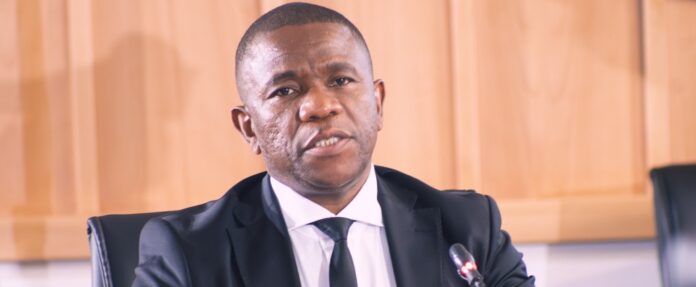KwaZulu-Natal Police Commissioner Lt-Gen Nhlanhla Mkhwanazi has told Parliament’s Ad Hoc Committee that he is in possession of explosive information implicating senior state officials in alleged criminal activities.
Due to the sensitive nature of the evidence, Mkhwanazi questioned whether the committee does allow for some sessions to be held in-camera.
Appearing before the committee, which is probing the allegations he made on July 6, Mkhwanazi hinted at recordings and documents that could expose high-ranking members within the security cluster. He expressed concern that making the information public could compromise state operations.
Records might compromise some people
“Honourable chair, there are a lot of things that are there, records, voice recording, that cannot be published because they are going to compromise serious people from the state.
“You would have heard in the Madlanga Commission there are things that are going to be held in-camera. I don’t know if there is things that are going to be held in-camera here. Because there are records,” Mkhwanazi told the committee.
He said the material detailed how senior officials were allegedly controlling the system. There were senior people in the security cluster discussing amongst themselves how matters should be dealt with, he added.
Mkhwanazi’s remarks painted a picture of a deeply compromised law enforcement and intelligence environment.
When chief evidence leader Norman Arendse asked if the material was admissible, he further addressed the suggestion by Brown Mogotsi that he should have brought in a policing expert under Section 205, clarifying the legal process around handling personal devices and obtaining evidence.
“Let me clarify because Brown Mogotsi says Mkhwanazi should have brought a 205. That is an expert in policing that was denied by a political party to be a member recently. But he claims to be a member in policing, that he knows for you to have this, you must get this.
Law on personal devices
“The Act, which these members have passed, says when you take Mkhwanazi’s phone you cannot download it without his authority. Ask him that I have your phone please open it, I want to see what is inside. I must grant you permission. If I don’t grant you permission you can’t do that,” said Mkhwanazi.
He further explained how intelligence structures lawfully intercept communications under judicial authorisation. And emphasised the delicate balance between intelligence-gathering and admissible evidence in court.
“There is no 205 there, so if you grant me permission then I download. So, once I download and I hear things that is one side. The other side is crime intelligence. If intelligence believes that they suspect that SC Arendse is in involved in this criminal activity, they apply through a judge to listen to your lines, and the judge grants them that.
“They are not going to tell you that ‘now we are listening to your lines, we are now monitoring your movements’. They are going to collect information. Unfortunately … intelligence structures are not going to court to say ‘this is how we extracted the information’.
“They are going to infiltrate and discover and give it to the investigation team. Investigation team will deal with it going forward so that it may be admissible in court. So, you are going to find some of the information that perhaps might be admissible in court. Some things may not be admissible in court,” said Mkhwanazi.



